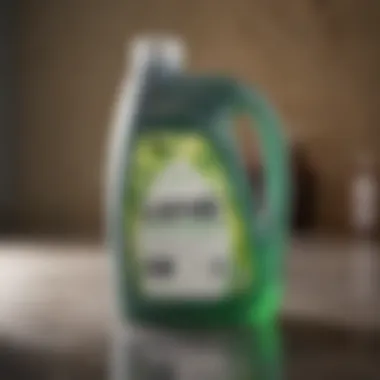Discovering Top Natural Laundry Detergents for Eco-Friendly Cleaning


Intro
In recent years, the laundry aisle at the supermarket has seen a notable shift in consumer preferences. More and more people are ditching traditional detergents laden with toxic chemicals and migrating toward the greener options provided by natural laundry detergents. With the increased awareness around the ecological impact of everyday products, many households are more discerning than ever about the items they bring into their homes.
But what really makes a laundry detergent "natural"? Is it the ingredients? The scent? Or perhaps the packaging? In this article, we aim to demystify this growing trend and help consumers make informed choices. The goal here is to thoroughly examine what qualifies a detergent as natural, the key ingredients to look for, and the performance of these eco-friendly options.
By diving deep into the specifics, we'll illuminate the strengths and weaknesses of various brands while factoring in sustainability and efficacy. Our intention is to equip housewives and house owners with the knowledge necessary to choose the best natural laundry detergent for their families and the planet.
Ultimately, making a shift towards natural alternatives isn't just a passing fad; it has real implications for your home and the environment. As we sift through the options available on the market today, it becomes clear that there's a lot more to laundry detergent than meets the eye.
Understanding Natural Laundry Detergent
In an era where environmental consciousness is gaining traction, understanding natural laundry detergents is not just a trend; it’s an essential shift towards better household practices. More homeowners and housewives are realizing the significance of what they bring into their homes, especially products they use on a daily basis. Gone are the days when convenience overshadowed health and sustainability. Today, it's pivotal to comprehend the various aspects of natural laundry detergents to make informed choices that echo care for both our families and the planet.
Natural laundry detergents typically incorporate plant-based ingredients crucial for effective cleaning without the harmful effects of synthetic additives. This eco-friendly approach not only contributes to the overall well-being of your household but also lessens your carbon footprint. As such, understanding these components is vital for selecting products that align with your values and lifestyle.
Defining Natural Components
Defining what makes a laundry detergent “natural” is a conversation starter in many households. In simple terms, natural laundry detergents consist of ingredients derived from renewable resources, such as plants and minerals. Common natural components include:
- Coconut oil: Often used for its gentle cleansing properties, it helps break down stains effectively.
- Sodium bicarbonate: Known as baking soda, it naturally softens water, enhancing the detergent's performance.
- Essential oils: These not only provide delightful fragrances but can also offer antimicrobial properties.
However, just because a product flaunts the label "natural" doesn't mean it is free from all harmful elements. It pays to read between the lines and understand that even some natural products can contain low levels of synthetic additives or chemicals.
Thus, knowing your ingredients is half the battle won. Understanding their sources and effects can lead to healthier choices for your laundry routine.
Regulatory Standards for Natural Detergents
Navigating the world of natural laundry detergents can feel overwhelming, especially with a plethora of products masquerading as environmentally friendly. This is where regulatory standards come into play. They serve as blueprints that guide both manufacturers and consumers in distinguishing truly natural products from those that simply play the marketing game.
In many regions, agencies have laid down guidelines that govern what can be labeled as natural. For instance, the U.S. Department of Agriculture and the Environmental Protection Agency have criteria defining organic and environmentally safe ingredients. These standards are crucial not only for consumer protection but also for promoting transparency within the market.
Many brands strive for certifications from organizations that uphold stringent environmental criteria. A certification can provide reassurance that the product meets certain benchmarks in terms of sustainability and health standards. Here’s a brief rundown of some notable certifications:
- USDA Organic: Indicates that the product is made with 95% or more organic ingredients.
- EPA Safer Choice: Shows that the product meets strict safety and environmental standards set by the EPA.
- Green Seal: Recognizes products that meet rigorous environmental standards across multiple criteria.
Before purchase, checking for these certifications can add an extra layer of confidence and clarity regarding the choices you make.
"A household's cleaning choices can impact the environment significantly; it's our responsibility to be informed shoppers."
In summary, understanding natural laundry detergents helps shed light on a cleaner, greener future. By recognizing what qualifies as natural and the regulations behind it, consumers can make choices that are not only better for their clothes but ultimately better for the world.
Key Features of Effective Laundry Detergent
When it comes to choosing a laundry detergent, especially a natural one, understanding the key features is crucial for making an informed decision. Effective laundry detergent not only ensures that clothes are cleaned thoroughly but also minimizes adverse effects on health and the environment. Here, we will delve into two essential aspects: the cleaning power and efficiency, as well as compatibility with different fabrics.
Cleaning Power and Efficiency
The effectiveness of a laundry detergent is largely defined by its cleaning power. This term refers to the detergent’s ability to remove stains, dirt, and odors from fabrics. When selecting a natural laundry detergent, look for those with components such as enzymes and plant-based surfactants, as they often exhibit impressive cleaning prowess without the harsh chemicals typically found in conventional options.
One of the critical considerations here is efficiency. An efficient detergent will deliver outstanding results even in smaller amounts, making it more cost-effective and sustainable in the long run. Many consumers have found that brand X, for instance, tackles tough stains while using less product. This not only cuts down on plastic use but also ensures that laundry is done with fewer resources.
"The power of natural ingredients should not be underestimated. They often match, if not surpass, synthetic alternatives in terms of performance."
Compatibility with Different Fabrics
Compatibility with various fabrics is another paramount feature that sets effective laundry detergents apart. Not every detergent behaves the same on all types of materials. Some might be too harsh for delicate items, while others might leave residues that can build up over time.


For instance, natural laundry detergents tend to be gentler on fabrics due to the absence of phosphates and optical brighteners. These ingredients, while common in traditional detergents, may damage fine materials such as silk or wool. A good practice for consumers is to check the label for compatibility indicators. Products like brand Y are specifically formulated to cater to a wide range of textiles—from your favorite cotton T-shirts to those delicate lace blouses.
It's advisable to conduct a patch test on a small seam or less visible area if trying a new detergent on an expensive or special fabric. This precaution ensures that you maintain the integrity of your garments while still achieving effective cleaning results.
In summary, focusing on cleaning power and compatibility can guide consumers toward a more satisfying laundry experience while selecting a natural detergent. By paying attention to these features, housewives and homeowners can ensure their laundry care aligns with both practicality and eco-conscious values.
Benefits of Using Natural Laundry Detergent
The choice of laundry detergent significantly affects not just the cleaning of fabrics, but also the environment and our health. In this age of sustainability, the spotlight is firmly on natural laundry detergents. They seem to have risen from the shadows of their synthetic counterparts, captivating consumers with promises of a gentler, greener alternative. So, let’s delve deeper into the key benefits of using natural laundry detergents, shedding light on why they matter.
Environmental Impact
The environmental advantages of natural laundry detergents can’t be overstated. Unlike their chemical-laden alternatives, natural detergents often boast a cleaner profile with fewer harmful ingredients. This becomes crucial when considering that run-off from laundry can eventually find its way into water systems.
Reduction of Harmful Chemicals
Natural laundry detergents often minimize the use of harsh chemicals, which can linger in the environment. Traditional detergents are notorious for containing substances that not only break down ecosystems but can also contaminate water supplies. By opting for natural detergents, one takes a step towards reducing potential threats to wildlife and habitats. Additionally, many natural detergents rely on plant-based enzymes and surfactants, which often break down more efficiently than their synthetic counterparts. In short, reducing harmful chemicals isn’t just about individual choices; it’s about protecting our planet as whole.
- Key characteristic: Natural detergents have plant-derived ingredients that lessen pollution.
- Benefits: They promote cleaner water systems and reduce risks to marine life.
- Unique feature: They often dissolve quickly, leaving less residue behind.
Biodiversity Preservation
The influence of laundry products extends into biodiversity preservation as well. When chemical detergents enter aquatic environments, they can contribute to algae blooms, which suffocate aquatic life by depleting oxygen. Natural detergents, however, are typically designed to be kinder to the surrounding ecosystem, thus supporting a richer biodiversity. Choosing these products means advocating for a healthier planet.
- Key characteristic: Eco-friendly formulations are aimed at reducing toxic runoff.
- Benefits: They create safer habitats for various species.
- Unique feature: Often sourced from sustainable materials, they encourage responsible farming practices.
Effects on Skin and Health
In addition to their environmental benefits, natural laundry detergents are becoming the go-to option for health-conscious consumers. These products significantly reduce the risk of skin irritations that may arise from the chemical residues left behind on clothes.
Minimizing Allergens
The components present in traditional detergents can trigger allergic reactions in some individuals. Natural laundry detergents work wonders in minimizing allergens. With less synthetic fragrance and no harsh chemicals, these products can be a more suitable choice for people who experience sensitivities or allergies. A smoother, less irritating experience can be especially important for families with young children or those with sensitive skin.
- Key characteristic: They typically have fewer synthetic additives.
- Benefits: Users report clearer skin and a decrease in allergic flare-ups.
- Unique feature: Many brands offer hypoallergenic selections specifically designed for sensitive individuals.
Sensitive Skin Considerations
Beyond merely minimizing allergens, natural detergents cater to sensitive skin in a variety of ways. Formulated without artificial colorants and fragrances, they are less likely to cause irritation or discomfort. For those prone to reactions, this thoughtful formulation can make a world of difference. It’s not just about cleaner clothes; it’s about fostering a lifestyle that aligns with personal well-being.
- Key characteristic: Free from harsh chemical agents and artificial perfumes.
- Benefits: They promote healthier skin without sacrificing cleaning effectiveness.
- Unique feature: Often enriched with nourishing ingredients like aloe or coconut oil, providing gentle care while washing.
Evaluating Popular Natural Laundry Detergents
Evaluating popular natural laundry detergents is essential for anyone looking to make sustainable choices without sacrificing cleaning performance. In this detailed exploration, we’ll break down the elements that set these products apart, bringing to light what consumers ought to consider before choosing their preferred detergent. The increasing competition in the eco-friendly sector means consumers have more options, but with that comes the challenge of making an informed choice.
Overview of Market Leaders
When it comes to natural laundry detergents, market leaders such as Seventh Generation, Ecover, and Molly's Suds have made notable strides. These brands have not only established a loyal customer base but also hold significant sway over prevailing marketplace trends.
- Seventh Generation is known for its commitment to sustainability and transparency in ingredient sourcing, providing detailed breakdowns of what goes into its formulas.
- Ecover prides itself on using plant-based ingredients and has pioneered practices in creating biodegradable products. Their commitment to reducing environmental impact resonates with eco-conscious consumers.
- Molly’s Suds targets those who have sensitive skin, ensuring their products are devoid of harsh chemicals and fragrances, yet still effective at tackling tough stains.
Each of these brands brings unique strengths to the table, appealing to various consumer segments with priorities ranging from thorough cleaning to sustainability.
Comparison of Ingredients and Formulas
Examining the ingredients and formulas of these natural detergents reveals much about their efficacy and safety. Consumers should pay close attention to the following aspects:
- Plant-Based Ingredients: Look for laundry detergents that list plant-derived surfactants. These play a pivotal role in lifting dirt and grime without the toxicity associated with conventional detergents.
- Enzymatic Action: Some formulas incorporate enzymes that break down protein-based stains, such as those found in food or bodily fluids, enhancing cleaning power without damaging the fabric.
- Fragrance Sources: Many brands often use essential oils or other natural sources for fragrance. While pleasant smells can enhance laundry experience, it’s critical to ensure they do not lead to allergic reactions.


"When choosing a natural detergent, it’s crucial to look at the ingredient list. Transparency is key; if you can’t pronounce what’s in your detergent, you might want to think twice."
It's essential to strike a balance. A detergent may use 'natural' ingredients, but if it contains unnecessary fillers or synthetic additives, it could defeat the purpose of going green.
In this realm of consumer choice, knowledge is power. By comparing these aspects across different brands, consumers can better align their choices with their values, ensuring their laundry routines support both their lifestyle and environmental sustainability.
Consumer Reviews and Recommendations
In today’s modern age, consumer reviews carry significant weight. As laundry routines shift towards natural products, feedback from users plays a pivotal role in guiding choices for laundry detergents. Consumers who have switched from traditional options to natural alternatives often share their experiences, showcasing their real-life results. This section delves into the importance of insights from product users alongside expert opinions to enhance understanding of the best natural laundry options.
Insights from Users
User-generated content provides a treasure trove of information. When regular folks use a detergent day in and day out, they notice things that even the best marketing campaigns can't highlight. For example, a user might mention how their clothes maintain a fresh scent longer with a specific natural laundry detergent compared to others. Such observations often lead to key decisions made in bulk buying or experimenting with different brands.
There's also the emotional factor involved.
- Satisfaction: Many users express relief after finding a detergent that does not irritate their skin or harm the fabrics in their wardrobe. They feel reassured when they discover a product that aligns with their ecological values.
- Trust: Consumers report feeling a deeper level of trust when they read reviews from people like themselves rather than polished commercials.
- Recommendations: Word of mouth is powerful. If one family member shares their positive experience, it quickly resonates within circles. Online platforms like Reddit are buzzing with discussions about laundry finds, and those insights can steer many in the right direction.
"The best advice often comes from those who have been in your shoes. If others rave about how well a detergent performs, it’s worth considering as you step into a more eco-friendly future."
Expert Opinion
While user reviews are invaluable, expert opinions provide a different layer of insight. Experts in the field of ecology and cleaning technology often conduct detailed analyses that scrutinize ingredients, effectiveness, and safety. Let’s break down what these savvy professionals have to say:
- Ingredient Analysis: Experts can identify and validate the efficacy of natural ingredients used in formulas. They can differentiate between the marketing buzzwords and those claims grounded in science.
- Practicality: Specialists also assess how these products actually perform, especially on tough stains or specific fabrics. Their assessments often include lab results that provide quantifiable comparisons, which are crucial for households bustling with kids or pets.
- Sustainability Goals: Many experts emphasize that not all natural laundry detergents are created equal. Gleaning insights from trusted sources can help consumers avoid greenwashing — situations where brands give a false impression of environmental friendliness. Reports from sites like Wikipedia or Britannica can enhance understanding about sustainability in household products.
By merging user feedback with professional input, consumers can forge a path toward making informed decisions when selecting a natural laundry detergent. Ultimately, both perspectives contribute to creating a comprehensive picture that aids in navigating the plethora of choices available.
Cost-Effectiveness of Natural Laundry Detergents
Understanding the cost-effectiveness of natural laundry detergents is essential in navigating the green cleaning landscape. While the initial price point might be a little steep for some, it’s worth diving into the long-term benefits these products can offer. When consumers look beyond just the sticker price, they often uncovers far more value in terms of health benefits, environmental sustainability, and overall performance. The aim here is to help households to better weigh their options by discussing not just the price but what that price translates to in practical and ethical terms.
Price Ranges and Value Propositions
Natural laundry detergents can range in price from a few dollars to upwards of twenty. This wide disparity stems from the ingredients used, packaging, and brand reputation. For example, brands like Seventh Generation tend to offer their products at a moderate price, while premium options like Biokleen may command higher costs due to their premium ingredient selection.
- Budget Options: Many natural detergents can be found starting around $10 for a 32-load bottle, which isn't far off from some conventional alternatives.
- Mid-Range Choices: Detergents in the $15 to $20 price range may offer better formulas and certifications, providing you with quality that aligns with your environmental ethics.
- Premium Products: For those willing to invest, premium products may cost $25 or more, often boasting added benefits like biodegradable packaging or further minimized chemical ingredients.
Before making a purchase, it’s crucial to consider what you value most. Is it the eco-friendly formula, how it affects your skin, or perhaps the sustainability of the packaging? Understanding these value propositions allows you to select a product that aligns with your needs and values without compromising on performance.
Long-Term Savings versus Conventional Detergents
When weighing natural detergents against conventional ones, many consumers might overlook the potential for long-term savings. Although natural options may appear pricier upfront, the savings come into play as you consider several factors:
- Concentration: Many natural laundry detergents are highly concentrated, meaning they often require less product per load, stretching out that initial investment.
- Health Costs: Using less harsh ingredients can lead to fewer health issues. Less skin irritation and allergic reactions translate into potential savings on healthcare visits and over-the-counter treatments.
- Environmental Impact: Many natural detergents are packaged in recyclable materials, and choosing these can contribute to less waste in the long run, indirectly saving costs related to waste disposal and environmental cleanup initiatives.
- Home Maintenance: Conventional detergents can leave residues that might damage clothing or appliances over time. Natural options, conversely, often result in less buildup and maintenance costs for washing machines.
It’s beneficial to look at your total cost of ownership over time — from purchase price to the costs associated with health and environmental impacts.
While it might require a leap of faith to choose a more expensive detergent initially, analyzing your usage patterns, health benefits, and environmental considerations often highlights that natural detergents could be the smarter choice for sustained savings. When shopping for laundry detergents, it’s worth keeping your eyes peeled for those small additions that simplify your life while taking care of the planet.
Environmental Certifications to Consider
In the increasingly eco-conscious landscape of household products, environmental certifications offer a crucial way for consumers to discern which natural laundry detergents truly adhere to sustainable practices. With numerous brands touting green labels, understanding these certifications helps in making informed choices that align with personal values and environmental responsibilities.
Understanding Labels and Symbols
When browsing for natural laundry detergents, you might encounter various labels and symbols on the packaging. Knowing what these signify is key to deciphering whether a product meets your expectations for sustainability. Common labels you might see include:
- EcoLogo: This certification indicates a product meets strict environmental standards set forth by an independent organization. It covers aspects like production processes and the presence of harmful substances.
- USDA Organic: Products with this label adhere to the standards set by the United States Department of Agriculture, assuring consumers that the ingredients are derived from organic farming practices, free from synthetic chemicals.
- Cradle to Cradle: This certification assesses the safety and sustainability of a product’s lifecycle—from the sourcing of materials to its potential for recycling or composting. It emphasizes a circular economy approach.


These symbols serve as shorthand for the quality and processes behind the product. Being aware of these can prevent consumers from falling for greenwashing—a term that describes false or misleading claims about sustainability. Before settling on a detergent, look closely at these labels to ensure the claims are backed by verifiable standards.
Trusted Certification Organizations
Several organizations specialize in testing and certifying products for their environmental impact. Being aware of these trusted bodies grants an added layer of assurance when selecting laundry products:
- Green Seal: Established in 1989, Green Seal evaluates products based on health and environmental criteria. Their certification is an indicator that the product has been rigorously assessed, ensuring it meets high standards for sustainability.
- EPA Safer Choice: This initiative from the United States Environmental Protection Agency identifies products that contain safe ingredients, emphasizing the importance of both consumer health and environmental protection.
- European Ecolabel: Recognized across Europe, this label helps consumers identify products with reduced environmental impact. It covers a broad range of items, including detergents, ensuring they meet high ecological standards.
These certifications not only reflect the efficacy of the product but also indicate the commitment of the manufacturer to environmental and health safety.
To sum it up, navigating the world of natural laundry detergents can be simplified by focusing on the Environmental Certifications that are meaningful to you. The labels and organizations mentioned above hold the keys to deeper insights into a brand's genuine commitment to sustainability. The next time you find yourself in the detergent aisle, arm yourself with this knowledge to help make choices that contribute positively to both your household and the planet.
The Role of Packaging in Sustainability
In the realm of the natural laundry detergent market, packaging is not merely a vessel; it presents itself as a vital part of the sustainability equation. Consumers today are becoming increasingly aware that the environmental footprints of products extend beyond what sits inside the bottle. The materials used for packaging can either contribute to pollution or echo the eco-friendly messages that brands aim to promote. Thus, understanding packaging's role is essential for making informed choices that align with one’s values.
Natural laundry detergents often reflect principles of sustainability, but if packaged in non-recyclable or harmful materials, the overall impact could negate their benefits. Innovations in packaging are thus crucial; it's not just about what you clean with, but how these products arrive at your doorstep.
Recyclability and Eco-Friendly Materials
When selecting a natural laundry detergent, it’s important to check if the packaging is recyclable. Many brands are now opting for materials like recycled plastics or biodegradable options that break down more harmlessly in landfills.
- Benefits of Using Recyclable Packaging:
- Reduces plastic waste in landfills.
- Encourages a circular economy by allowing materials to be reused.
Eco-friendly materials often come with certifications or recognitions that add credibility. Being mindful of these attributes can help consumers support brands committed to the same values they cherish. Think twice before tossing the container; check for any labels or pursuants that indicate how to recycle choices properly.
Innovations in Detergent Packaging
The detergent packaging landscape is witnessing creativity and advancement that aligns with eco-conscious consumer needs. From refillable options that allow consumers to reuse containers, to concentrated formulas that reduce packaging size, innovators in the field aim to reshape how people perceive laundry care.
- Notable Innovations:
- Concentrated Formula Packaging: Reducing the amount of liquid needed for each wash minimizes both packaging and transportation emissions.
- Refill Stations: Some brands are setting up stations where you can refill your detergent, significantly cutting down on disposable waste.
These developments signal a shift toward a holistic approach to product sustainability. Not only is the interior effective in cleaning, but the exterior is also designed to minimize environmental impact. These factors offer a win-win; you can ensure your laundry is cleaner and greener.
"Choosing products with sustainable packaging helps pave the way for a cleaner planet, proving that small choices can lead to significant changes."
As you embark on your journey to find the best natural laundry detergent, consider the materials and methods of packaging. The choices you make today echo beyond the laundry room and play a key role in fostering a sustainable future. Whether it’s opting for minimalistic designs or looking for companies that lead with an environmental mission, these decisions reflect a larger commitment to sustainability in everyday life.
Making the Switch to Natural Detergents
Switching to natural laundry detergents isn’t just about being trendy; it’s a profound change that resonates with our increasing awareness of health and environmental issues. Consumers today are more conscious than ever about the products they bring into their homes. Using natural detergents can have significant advantages that go beyond just cleaning clothes. They tend to be gentler on both the skin and the planet.
Transitioning Tips for Consumers
Making the move to natural laundry detergents might seem daunting at first, but with a little guidance, it can be smooth as butter. Here are several tips to help ease the transition:
- Gradual Change: Start by mixing your new natural detergent with your usual one. This can help your washing machine adjust without you feeling the sudden switch.
- Test Small Batches: Before diving headfirst, try a small load with the new detergent. This lets you see how it performs with your fabrics and if it meets your expectations regarding scent and stain removal.
- Read Labels: Look for clear labeling on the detergent. Ingredients like plant-based surfactants and biodegradable materials mean you’re getting a quality product. The fewer ingredients, the better.
- Adjust Washing Habits: Sometimes, natural detergents work best with a longer wash cycle or warmer water. Don’t hesitate to tweak your washing routine.
- Check Scent Preferences: Natural products often feature essential oils or natural fragrances instead of artificial ones. Experiment with a few different brands to find what resonates with you.
Changing habits can feel like navigating a maze, but sticking to these steps can pave the way for a greener laundry routine.
Common Misconceptions and Challenges
When it comes to natural laundry detergents, misconceptions abound. Some of the hurdles that consumers often encounter include:
- Perceived Ineffectiveness: One of the biggest myths is that natural detergents can’t tackle tough stains. In reality, many brands have formulas that rival conventional detergents in cleaning power. It may take some experimenting to find the right product for stubborn stains, but don’t let preconceived notions hold you back.
- Price Concerns: Some believe that natural options are far more expensive than regular detergents. While this can be true in some cases, the overall value often balances out with the reduced environmental impact and the benefits to skin health.
- Longer Rinsing Times: There’s a rumor that natural detergents require more rinsing cycles, which can be time-consuming. However, many users find that with proper dosage, there's no noticeable difference in rinsing needs.
- Availability Issues: Many still think natural detergents are hard to find, but they are increasingly available at grocery stores, health food shops, and online. Just knowing where to look can be half the battle.
Navigating these misconceptions isn’t just about dispelling myths; it also involves embracing change in our habits and preferences. As more people turn to natural detergents, these transitions ultimately contribute to a healthier home and planet.
"Making informed choices about the products you use is essential to fostering a sustainable lifestyle. Every small change matters."
Switching to natural laundry detergents is more than a practical choice; it’s a step towards a conscientious way of living, making a positive impact on your home and environment.















